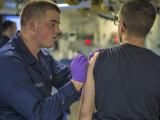Sep 4, 2007 (CIDRAP News) – A second-generation smallpox vaccine made by the British biotechnology company Acambis plc and stockpiled by the US government as protection against bioterrorist attacks has been approved by the US Food and Drug Administration (FDA).
The FDA announced its approval of the vaccine, called ACAM2000, on Sep 1. It "is intended for the inoculation of people at high risk of exposure to smallpox and could be used to protect individuals and populations during a bioterrorist attack," the FDA said in a news release.
The vaccine also will be used to protect US military personnel, according to an Acambis news release. More than 1.2 million military members serving in high-risk areas like the Middle East have received smallpox shots since early 2003, according to Department of Defense (DoD) data.
Acambis said it has already supplied 192.5 million doses of ACAM2000 to the Centers for Disease Control and Prevention (CDC) for the Strategic National Stockpile. The product makes up the majority of the US supply of smallpox vaccines, the company said. Federal officials have said the stockpile is large enough to protect the entire US population against smallpox.
ACAM2000 uses vaccinia virus, a relative of smallpox, and is derived from Dryvax, an older vaccine that was grown on the skin of calves and used in global smallpox eradication programs. The newer vaccine is grown in cell culture, which is thought to produce a purer vaccine with less risk of causing rare but serious complications.
"The vaccine is manufactured using modern cell culture technology allowing rapid and large-scale production of a vaccine with consistent product quality," said Jesse L. Goodman. MD, MPH, director of the FDA's Center for Biologics Evaluation and Research, in the agency's news release.
The Acambis news release states, "ACAM2000 was developed to be a modern smallpox vaccine with a safety and efficacy profile comparable to the US's licensed previous vaccine but manufactured using the latest production techniques."
The company said it is currently in "advanced negotiations with the CDC for a warm-base manufacturing contract," meaning a deal to provide a long-term ACAM2000 production capacity located entirely in the United States.
In licensing the vaccine, the FDA followed the recommendation of its Vaccines and Related Biological Products Advisory Committee, which unanimously endorsed the vaccine in May.
The FDA said ACAM2000 was tested in people who had never received a smallpox shot before and in people who had been vaccinated many years earlier. The percentage of previously unvaccinated volunteers who had a successful immunization reaction was similar to that for Dryvax, and the vaccine also was found acceptable as a booster in those who had been vaccinated before, the agency said.
People who have weakened immunity, such as those with HIV and those undergoing chemotherapy, should not receive conventional smallpox vaccine except in emergencies, according to the Department of Health and Human Services (HHS).
The ACAM2000 license requires that providers and recipients of the vaccine be educated about the risks, the FDA said. Vaccinees must be given an FDA-approved medication guide that provides information about care of the vaccination site as well as potential serious side effects.
In studies, about 1 in 175 first-time smallpox vaccinees experienced myocarditis and/or pericarditis, the FDA statement said. Of 10 adults who were affected, 4 had no symptoms, and all but one recovered from their symptoms by the end of the study.
In the US military vaccination program, 140 cases of myopericarditis had been recorded as of May 2007, according to the DoD's online safety summary. Detailed follow-up cardiac testing was done in 64 cases and yielded normal results.
In June HHS awarded a $500 million contract to Bavarian Nordic, a Danish company, for 20 million doses of a smallpox vaccine that is expected to be safer for people with weakened immune systems. The vaccine, called Imvamune, uses a vaccinia virus that has been weakened so it can't replicate in humans.
Smallpox was eradicated in the 1970s, but there is concern that remaining stocks of the virus could fall into the hands of terrorists. The former Soviet Union made large amounts of smallpox virus in its biological weapons program. Known stockpiles of the virus, kept for research, are stored in two approved labs in the United States and Russia.
See also:
Sep 1 FDA news release
http://www.fda.gov/NewsEvents/Newsroom/PressAnnouncements/2007/ucm108976.htm
May 18 CIDRAP News story "FDA panel recommends smallpox vaccine approval"
US Department of Defense smallpox vaccination safety summary
http://www.smallpox.mil/event/SPSafetySum.asp



















